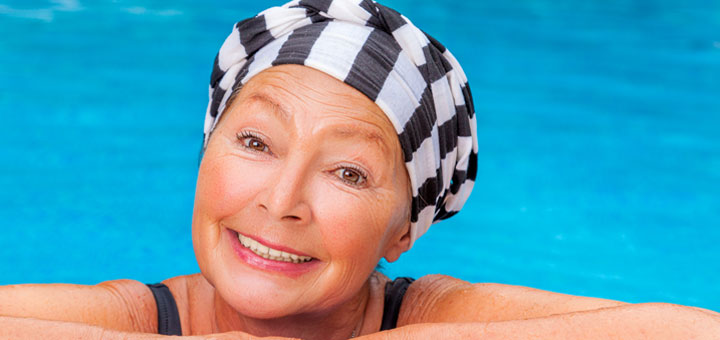As the British Gas Swimming Championships are coming to an end today, there seems to be no better time to offer you our swimming advice!
When was the last time you went for a swim?
If it was either at the school pool with plasters and beetles floating on the surface or lounging around on a lilo then you’ve forgotten what you’re missing. Swimming is wonderful.
It can involve most of the major muscle groups, it strengthens and tones the muscles and bones and, due to the resistance of the water, it can burn up to a quarter more calories than similar movements out of the water. I talk with the zeal of the recently converted as I’ve only just begun to swim again regularly…and I love it!
Spend a little time looking for a pool that you like. If it’s too busy or too cold then you’re not likely to stick to a swimming exercise plan.
I recommend swimming as an exercise to many of my patients, whether they are looking to improve their general fitness, training for a competition or looking for a suitable exercise for arthritic joints. Because swimming doesn’t involve you pounding on hard surfaces, you won’t run the risk of joint injuries associated with running or other weight bearing exercises. However, you do need to learn a good technique to avoid swimmers’ problems such as shoulder and neck pain or low back and knee problems.
Swimming Advice
- The best preparation for a successful swimming workout is to warm up by stretching the muscles in your neck, shoulders, legs and low back. Stretching increases flexibility in the muscles and lessens the chance of injury from strenuous contraction during swimming.
- Start your swim gradually and build up to a steady pace. Varying the strokes you use helps ensure proper muscle balance and to prevent injury. Using a single stroke repeatedly can overwork one group of muscles and cause inflamed tendons (tendonitis).
- Look down instead of ahead as you swim. If you only look forward, you can strain your neck muscles and compress the nerves. Don’t like water up your nose? Then get one of those nostril pincher thingies. It’s better than neck pain. I don’t recommend breaststroke as it involves too much strain on the neck as you crane your head out of the water.
- When you are nearing the end of your swim, slow down to cool down gradually.
- Stretching again after the swim will make it easier to stretch the next time.
If you’re not a confident swimmer, then treat yourself to a few sessions with an adult swim instructor – most pools will be able to recommend someone. Go on – starting regular swimming sessions will make an amazingly rapid difference to your health and wellbeing.
Avoid “swimmer’s shoulder”
Shoulder injuries are common amongst keen and competitive swimmers. Here are three tips on how to avoid the causes of shoulder injury.
- Poor stroke technique: For freestyle or crawl strokes, the swimmer must pull with the large muscles of the chest and back. If the swimmer’s hand drifts to the outside or crosses over midway, the smaller muscles of the shoulder are used instead. The swimmer will eventually overtax the muscles and injury will occur. Ask a friend or swimming coach to analyse and correct your stroke.
- Improper posture: Most swimmers over train their chest muscles. They develop poor posture with rounded shoulders. This puts unnecessary stress on the muscles, tendons and ligaments, setting the stage for shoulder injuries. Work on a good balance of strength in the chest and back muscles work with your chiropractically trained health professional to develop good posture. Also on our main website check out the postural and stretching exercises.
- Over-fatigue: Over training by increasing distance or speed too quickly can injure the shoulder. A general rule is to increase training distance or speed no faster than you feel you can easily accomplish. If you feel excessively tired or achy afterwards you are more than likely over doing it and potentially causing yourself a future problem.
If you want more advice on swimming techniques or additional information about swimmer’s shoulder, contact our Benfleet Healthcare Centre or South Woodham Healthcare centre.

